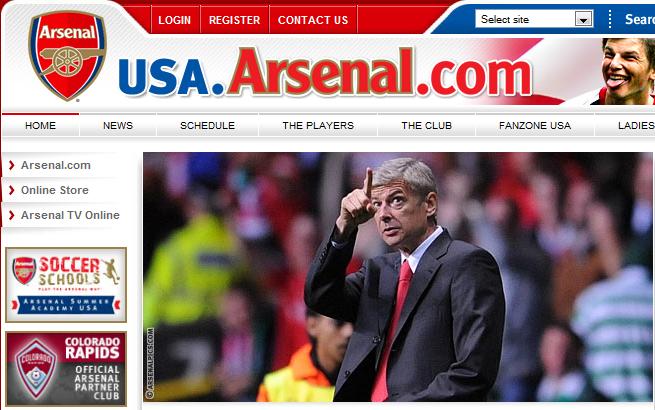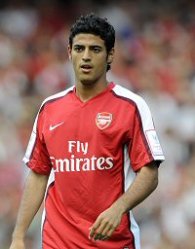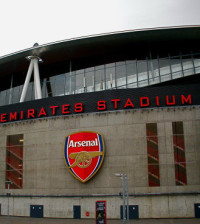- Arsenal plot audacious swoop to sign Ousmane Dembele
- Arsenal showing ‘concrete’ interest in Kingsley Coman
- Arsenal in front of the queue to sign Jesus Rodriguez
- Arsenal eye AC Milan’s Malick Thiaw for summer move
- Arsenal want Guler & Endrick in a surprise swap deal
- Arsenal to be handed chance to sign Joao Palhinha
- Arteta praises his squad after brilliant Madrid triumph
- Arsenal join race to sign Marseille star Luis Henrique
- Confirmed line-ups: Real Madrid vs Arsenal – Kiwior and Merino start
- Raya confident as Arsenal aim for UCL semi-Final spot
Is the New USA Arsenal Site Really Necessary?

A few days ago, Arsenal launched USA.Arsenal.com, an Americanized version of the official club website. It is interesting that it took until September 2009 for this to happen, because Arsenal have been one of the most popular clubs in the States since the rise in popularity of the Premier League in the mid 1990s. Anyone who has been following the club for any length of time would no doubt have already visited the standard official club website long ago, so why it has taken the club this long to implement the idea is a bit of a mystery. Nonetheless, it is here now, and so let’s take a look at what makes it different from the standard Arsenal website.
Upon entering, the site presents one with the familiar banner, only now, Arshavin, Carlos Vela (a nod to Hispanic USA Arsenal fans?), Walcott, and Cesc’s pictures display against an American flag background (the juxtaposition somehow feels a bit absurd). Below, the usual news headlines from the standard site are listed. The links at top are noticeably different, with “Schedule” replacing “Fixtures” (and within it, “Standings” replacing “League Table”), “The Players” replacing “Players,” and the addition of a “Fanzone USA” tab in addition to the “Ladies” tab.

The rest of the features targeted specifically to American fans are less problematic but still clearly aimed at the newcomer rather than the hardcore. There are features on the history of the club (“Arsenal is not just any old football club. It is a by-word for history…”), features on Fulham (with the sort of bizarre subhead “U.S. soccer fans know about Fulham, but may not realize it”), a feature on Paul Mariner, former Gunner, now an assistant in MLS, and an article on the Baltimore Gooners (presumably this will change to highlight a different supporters’ group from time to time). At the bottom are links to information about the competitions (“What Arsenal compete for”), wallpapers, twitter links, and a guide to the Premier League.
For all the targeting of newcomers, there are numerous useful bits on the site. There is a link to the Arsenal USA Summer Academy prominently featured on the left-hand side of the site. Recent BBC News football headlines are on display. Most important, and most useful, though, is the link to the USA Arsenal Supporter’s Club. This is something that has always been difficult for a fan to locate on the standard site, and its presence on the USA site will only make it easier for Gooners nationwide to find each other, meet up, and watch matches together. This is a good thing for fans both old and new, and particularly for fans who do not know where to go to meet other fans and see matches.
The custom-tailoring of websites for different nations and regions is nothing new, and perhaps the only surprising thing is that it has taken Arsenal this long to implement a specific US site (although it has long had translated versions of the site for Chinese, Thai, and Korean readers). However, in the end, the USA site is probably suitable only for newcomers to both the sport of football and the club itself. Fans of Arsenal and English football will find most of the articles and terminology either redundant or unnecessary, and even newcomers will most likely quickly find the USA site to be superfluous. Despite a couple of handy features, then, the USA Arsenal site feels like a classic case of “if it ain’t broke, don’t fix it.”
ARSENALSTATION ADDS:
I fully agree with Ted. The first time I saw it, I thought it was a bit demeaning or condescending actually, but I can appreciate their efforts. I just 
The kind of supporters who would rather see the club specifically accomodate them and their American sporting sensibility are not the kind of long-term supporters the club has actually generated by doing nothing, without even knowing it, over the last 15 years. I would venture to say that if you ask any American who has supported the club since the 90s, why they began supporting the club, Dennis Bergkamp will enter the conversation shortly after. Americans appreciate sport at its highest level, which is why there are more supporters of Premier League clubs than MLS clubs in the States. The biggest weapon in Arsenal’s arsenal (like that?)
Most Arsenal supporters, and even the club, do not fully realize the breadth of support there is for the club here in the United States and it remains a great untapped resource. This is something the other big 4 clubs have done far better than we have. Chelsea, for instance, has a US-based online club store. Arsenal, on the other hand, charge £18 for shipping any size package to the US; whether you buy furniture items or just a keychain. This does not encourage sales from overseas. And Americans are generally even more “gear-hungry” than domestic supporters because wearing our shirts, hats, jackets, or whatever is one of our primary connections to the club.
Chelsea and United have both done regular pre-season tours of the United States, as well. This is something Wenger has not been keen on in the past and I had always been able to see his point. He felt that the extra traveling was unnecessary and would prove detrimental to the team. But Chelsea seem to have dealt with it well in recent years. Giving American supporters and fans-to-be a chance to see the club in person would prove a great boon to the club here in the States. Obviously, even from an American perspective, the rumoured 39th-match was ridiculous but surely the club could come out to the States for a week or so in mid-July once every couple of years.
Overall, it is nice to see the club realizing the potential of the American market, something that was there long before Stan Kroenke and the Rapids link, but it would also be nice to see the club make strides in accomodating the already large number of faithful and loyal American supporters by looking at the lengths the other big 4 clubs have gone to connect with their American support base.









98 Comments